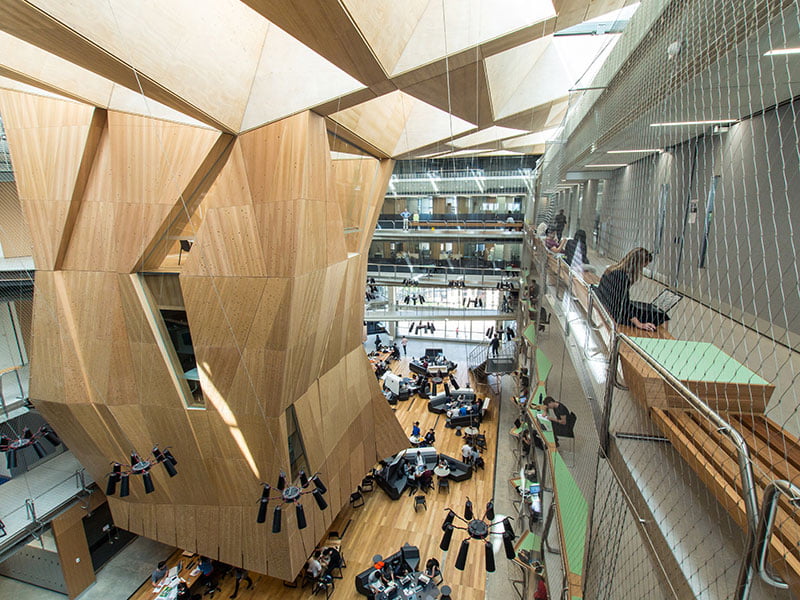Universities are institutions where new ideas, independent and cutting-edge research thrive. The culture of universities is to push boundaries, stress test ideas and think outside the box.
But increasingly, Australia’s universities are being pushed into unsustainable funding models while, at the same time, they employ outdated bureaucratic processes, are overly-depend on burdensome grant applications, and increasingly suffer policy uncertainty and casualisation of the workplace.
The Australian Government continues to push the sector into focusing on commercial outcomes and to generate impact for Australia and Australians more broadly, but with little change in policy or concern for how this will happen.

Current initiatives to foster industry investment in academic research and development (R&D), and industry-academia in general, are overly simple, one-off or linear funding models which place the focus on academics working with industry, rather than building industry capability and interest in working with academia or acknowledging the key role fundamental, pure research plays in innovation.
Real action in the form of increased funding, as well as a funding model, rethink to provide new and long-term funding for every part of the R&D value-adding chain, from the pure research sector through to entrepreneurship is required.
We must ensure that Australia capitalises to the best of its ability on its world-leading minds, capabilities and resources within our shores.
There is little doubt that the previous federal government’s relationship with universities was less than amicable.
In the past two years alone, there have been ad hoc changes to undergraduate funding,1 improper use of veto power over peer-reviewed grants,2 and ongoing efforts to pit universities against each other for small pools of funding in the pursuit of research commercialisation.3
This short-term mentality of giving with one hand and taking from the other has reduced the capacity of the sector to contribute to the very challenges which need to be addressed. We now have the opportunity, through the new government’s commitment, for an independent inquiry into the way the ARC is funded,4 to create real and tangible long-term change in the future of Australian research.
If Australia is to reach its full potential and become a true innovation hub, it needs the confidence and the guarantee of long-term funding to take risks and invest in its ideas and people. It needs the time to be innovative, the respect and patience to develop ideas from blue-sky to entrepreneurial, and investment in people to drive it. This, in turn, will inspire confidence in investors, and in industry looking to reach further than they had before, and to partner in real terms with our universities.
A 2021 Deloitte Access Economics Report found that for every one dollar spent on R&D in Australia’s universities, five dollars is returned to our gross domestic profit (GDP).5 This, in and of itself, should be enough to guarantee continued and unmitigated support for our universities, but we must not rest on our laurels. While the quality of our university research is world-renowned, we still need to do more to connect our industries to the ground-breaking and innovative ideas inside our universities.
This must be a long-term agenda, where the nation’s industries and universities see collaboration as ‘business as usual’.6 Where long-term projects and goals are supported, where short-term gains are only part of the research landscape.
We need investment in our people – in the talent we have here and in bringing new talent into Australia and keeping them here. To be truly innovative and to take the big risks that bring about big rewards, we need real sustainable investment in fellowships, security in research jobs, and less onerous grant applications.
We need to provide our graduates with clear pathways from their studies to the research and innovation jobs of the future. We want them to define what future industries look like, not just let them fit somewhere into a status quo system, and we need to give them the confidence and security to do that.
We can, as a strongly developed nation, provide people with the opportunities to push boundaries, drive innovation, and take on bigger risks with even bigger long-term gains. We can do this by developing funding and employment mechanisms that encourage researchers to define, not conform.
Likewise, we need to invest in long-term large collaborative projects that bring researchers and industry together, that cut across institutions and disciplines and that give researchers and industry an insight into how each other works and what they can do.
To give researchers the funding and freedom to shake off the bureaucratic shackles of the short-term grant rounds and look to solving the big research questions.
Utilising the connections and skills of institutions like the CSIRO to embed industry and universities would be a great start. A new program of researchers across the value chain, from the fundamental to the scale-up, all working on the same problems at different stages would be a game changer.
We must create real, tangible everyday connections to industry and focus on building and supporting local industries that care about R&D to encourage long-lasting, cohesive bonds between industry and academia in Australia.
Transformative change to the way we fund research in Australia is required. We need to think big.
But we also need to be careful that we don’t forsake fundamental blue-sky research in the pursuit of applied research and collaboration with industry. We need to do both and everything in between to be truly innovative.
We need to bring people from each end of the value chain to work with each other, and understand the challenges, obstacles, and opportunities that each provides.
Kate McGeoch is Chief Operating Officer Centre at of the Australian Research Council of Excellence in Exciton Science at The University of Melbourne. She has worked in research administration at Monash University and The University of Melbourne since 2014, predominantly on ARC and government grant schemes, and has extensive experience in major publicly funded research projects. Since 2017 has managed three major ARC initiatives and two Centres of Excellences in the role of COO.
Footnotes
- Norton, Andrew, ‘The inequity of Job-ready Graduates for students must be brought to a quick end. Here’s how’, The Conversation, Mon 6 June 2022 6.02am AEST.
- Lu, Donna, ‘Academics condemn government’s ‘shortsighted’ decision to veto research grants’, The Guardian, Tue 11 Jan 2022 03.30 AEDT.
- Karp, Paul, ‘Australian universities to vie for Coalition’s $200m research funding boost’ The Guardian, Wed 24 Nov 2021 20.04 AEDT.
- Brookes, Joseph, ‘Jason Clare outlines Aust Research Council funding review’, InnovationAus.com, Thursday 7 July 2022.
- Catriona Jackson, ‘Universities Australia Argues the Sector’s Case for Federal Support’, Universities Australia
- Dewar, John, ‘Next Government Must Clearly Commit to Supporting Uni Research’, Universities Australia
Do you know more? Contact James Riley via Email.

